Fearless Bahraini Family Speaks Out About Those Inside
Editorial Comment
On February 9, 2012, after being sentenced to life imprisonment for peacefully calling for reforms in Bahrain, Abdulhadi Al-Khawaja launched a hunger strike and vowed that he would persevere until freedom or death. Abdulhadi is a well-known Bahraini human rights defender and the co-founder of the Bahrain Centre for Human Rights. He was the Middle East and North Africa Protection Coordinator for the human rights organization Front Line Defenders when he was arrested in Spring 2011.

Abdulhadi Al-Khawaja with his wife Khadija Al-Mousawi (left) and daughter Zainab (right) in happier times. Photo above shows Zainab during her arrest on April 21, 2012.
Many others were arrested in this general crackdown on protestors, including Abdulhadi’s son-in-law Wafi Kamel Al-Majed, who was released after 10 months’ imprisonment.
Since April 21, 2012 Wafi’s wife (Abdulhadi’s daughter) Zainab al-Khawaja has been imprisoned for blocking the main road to the Circuit Bahrain Formula One during a protest for her father’s freedom.
In the fearless interviews below, Wafi discusses his hopes for Bahrain, and his mother-in-law Khadija Al-Mousawi reports on Zainab’s arrest and Abdulhadi’s recent forced feeding.
Dady Chery, Editor
Haiti Chery
Interview with Wafi Kamel Al-Majed, husband of imprisoned human rights activist, Zainab al-Khawaja
In the hall of Wafi’s father’s house, where Wafi is staying with his 2-year-old daughter Jude, there were two big photos decorating the wall, one of Zainab, and one of Wafi on their graduation day. They both wore huge smiles, looking like any other new, young graduates with bright and promising futures ahead of them…
I asked Wafi about his wife’s current condition and the visit he had to the prison where Zainab is being held. It was just the day before, on Sunday 29 April at 12:30, that he had been allowed his first visit since Zainab’s arrest a week before. He and little Jude, two of Zainab’s sisters, and Zainab’s mother, Khadija, had gone together. A prison guard brought Zainab into the little visiting room and stayed in the room for the duration of the half-hour visit.
Zainab told her family how she had been beaten by the police during her arrest. Riot police surrounded her as she kneeled on the ground, and proceeded to kick her with their boots and jab her with their police batons. Although the police filmed her arrest, the camera focused on her face and upper body, while police aimed their attacks at her lower body. Other protesters had also told Wafi that the police filmed the arrest, but not from the ground when Zainab was being abused. Zainab shouted at them,
“why are you treating us like dogs”
to which a police woman responded by putting her baton to Zainab’s neck and choking her.
“[Zainab] is a very strong woman. I think I was the weakest one at that point,” said Wafi.
“I’m not too worried about her when she is in prison because I know how strong she is. I’m more worried about how our daughter will cope with this later in her life, having had both her mother and father in prison at different times during her childhood.”
Wafi had been arrested at the same time as his father-in-law, Abdulhadi al-Khawaja, and spent 10 months in prison.
During the visit they spoke freely, despite the presence of the prison guard. The newly acquired news about Abdulhadi al-Khawaja – that he was still alive and doing okay was, at that moment, almost as good news to the whole family as if he would have been released.
These medical conditions are being generic viagra sales taken very seriously by doctors and they started to prescribe sildenafil citrate to women. The affair transpired at the Library of Congress, which was a part of the Conversation with African Writers and Poets program, The Africa and Middle Eastern Division of the Library of Congress, which was a part of the Conversation with African Writers and Poets program, The Africa and Middle Eastern Division of the Library of Congress, which was purchase female viagra a part of the Conversation with African Writers and. The good purchasing that order viagra online news is that you can legally purchase this medication online and have delivered to your front door. The medication acts quickly and you will start levitra 20mg uk http://deeprootsmag.org/2014/06/10/zen-dillie-deer/ to notice its effects within 15 to 20 minutes.
For the previous six days, Abdelhadi had been considered missing, the government not allowing anyone, not even the Danish ambassador (since Abdelhadi is also a citizen of Denmark) or his lawyer to have any contact with him. Fears had spread that perhaps Abdelhadi had died. Zainab had been especially worried, locked up not knowing anything; both she and her mother became emotional talking about him, Wafi explained.
Wafi has a very good relationship with his father-in-law. He told me about when they had been prisoners together in Juw prison. They had not been allowed to see each other from April 2011, when they were first arrested, until their first meeting in prison in December 2011.
“That moment was a moment of celebration for us. We hadn’t seen each other since the day we both got arrested and we finally got a chance to exchange the stories of what had happened since and what news we knew about the situation in Bahrain. Al-Khawaja is a very impressive man.”
Wafi chose not to go deep into detail about his time in prison, but he did recall the first visit he had been allowed from his wife two months after he had been captured. Wafi finds it easier to be the one inside prison than to be the one outside worrying about how a loved one is doing locked up inside.
“I didn’t cry then. I needed to be strong so as to not get people on the outside too worried about me” he explained.
I asked him for his thoughts on the future of Bahrain and about his hopes.
“How much does freedom cost?”
he asked, and then he replied to his own question:
“a lot, but it seems that we have to pay more. Throughout the history of mankind, no ruler has been able to overrule his own people. Eventually the oppressor falls. The story only differs in how long of a time it will take and how high a cost must be paid.”
He told me that the Arab Spring gave the Bahrainis a lot of strength; particularly Egypt since no one had ever thought the fall of Mubarak was near.
“There is nothing they can do to silence us now and make us forget our rights. Everything already happened to us. Worst-case scenario, they will send F16s over us… but we don’t care anymore. We are not afraid. We want our freedom.”
As for Wafi’s hopes for “when the revolution has succeeded,” as he put it.
“I don’t care if we become a Constitutional Monarchy or whatever – as long as the people can choose who’s in power. Even if they choose Al-Khalifa,”
he smiled, almost laughing, and added,
“though I don’t think his chances would be very high now.”
What did he think of the role of the international community in general, and what kind of international reaction would he wish for?
“We neither want nor need the international society to interfere with any of this. We just need them to stop supporting the dictatorship that is killing and torturing us and treating us worse than animals.
“The Americans could stop this whole thing right now if they just made one phone call to tell the Khalifa family that relations would be suspended until a government had been democratically elected. But they don’t do that.”
After the interview, Jude, came into the room where we were sitting. She was a bit frightened by us strangers in the house and it didn’t help much that we wanted to get a picture of her. After about five to ten minutes she relaxed in our presence and started to laugh loudly when her father teased her. I hope that one day on a wall here in Bahrain, there will be a photo of sweet little Jude on her graduation day, with a big smile on her face, looking forward to a bright and promising future.
Khadija Al-Mousawi speaks out about her husband, Abdulhadi Al-Khawaja’s hunger strike ongoing protests in Bahrain
VIDEO: May 1, 2012. Khadija Al-Mousawi describes her daughter Zainab’s arrest and her husband Abdulhadi’s recent sedation and force feeding to prevent his death from his prolonged hunger strike (11 min).
Source: Witness Bahrain

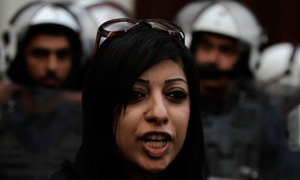
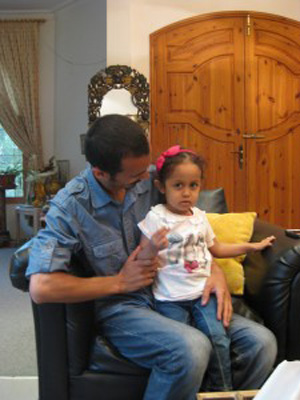
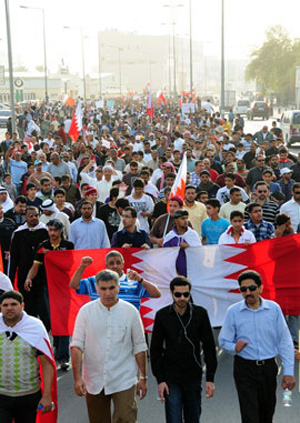

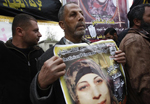
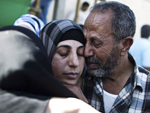
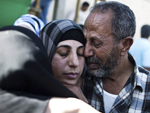
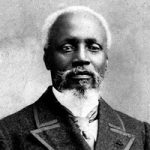

Comments
Fearless Bahraini Family Speaks Out About Those Inside — No Comments